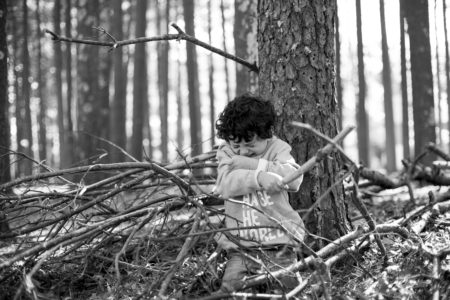PTSD: What Are The Symptoms
One does not experience PTSD until the trauma that was inflicted is over. It is “Post Traumatic”, and the “Stressful” reaction to what happened continues in the victims mind and subconscious. PTSD is only diagnosed when the individual is no longer in the traumatic environment. One could be completely safe and everything is fine but they may still act and even feel like the danger is still around.
A Stay-At-Home Mom With PTSD

What are some symptoms of post-traumatic stress disorder? As a stay-at-home mom of two small children I did everything I could to keep a clean home many years ago. I wasn’t disciplined enough to have OCD (joking) but I did have a daily routine and if anything interrupted that it caused me anxiety if I didn’t get things done. When Sam and I moved into our second home, I found myself more on edge. I would snap a lot quicker and almost picked fights with him. I remember one day in particular where I spent all day working hard cleaning but wasn’t finished when I heard my husband’s keys on the doorknob. I became anxious and I quickly started making a checklist in my head of what I didn’t do and what I was missing. I remember him coming in and literally standing at attention when I saw that Joey (my son) was in dirty clothes and there was a diaper on the floor. I ran quickly to grab the diaper, organize the futon cushions and apologize for Joey’s clothes. As I started explaining why Joey was a mess, Sam dismissed it—because he didn’t really care—and proceeded to go into the bedroom to lay down from a hard day’s work. I became agitated, annoyed and short with him as my heart was racing and my anxiety was building.
Shortly after he asked me a question, I snapped at him—with no understanding on my part of why. I started thinking how he didn’t comprehend the work I went through; he took me for granted—and on and on. What was wrong? Why was I mentally attacking him? The answer to this question would not be answered until much later.
Since those moments Sam and I have moved again and believe it or not, the change impacted me tremendously. Our marriage grew stronger in time as we learned how to work together and also deal with our own personal issues. One major issue I had to deal with was the sound of his keys on the doorknob. Let me explain…
As a child I had a lot of responsibilities. At the age of 7 years old my mother went back to work and I was forced to watch my newborn baby brother very early each morning while my father was sleeping before I was to get up for school. After school, I was forced to continue taking care of him till my mother came home from work. From the time he was born I took care of him—at as young as eight-years-old, I was left at home by myself to clean the house, watch and take care of him, do my homework and help him with his homework (when he got older). When my father came home I knew it was him because his keys would jingle on the brass metal doorknob. I would run to my room, hear his footsteps and see his shadow go by my room. Then I waited for him to go into the kitchen and call for me if something was wrong. Many days I sat in my room on my bed holding my breath and trying to silence my heartbeat as I was waiting for him to call my name. A majority of those times were followed by my name being called and I would be interrogated about what I did since I came home and if the answer did not suffice I was threatened and/or an unnecessarily given a beating.

One does not experience PTSD until the trauma that was inflicted is over. It is “Post Traumatic”, and the “Stressful” reaction to what happened continues in the victims mind and subconscious. PTSD is only diagnosed when the individual is no longer in the traumatic environment. One could be completely safe and everything is fine but they may still act and even feel like the danger is still around.
When my husband would come through the door, I was always taken back to being that scared little girl waiting for my interrogation and some explosive behavior from my father. My heart would start racing and I would listen for my husband to call my name or question why something was out of place. I would be apologetic, and even scared if one of the kids were dirty when he came home. Flashbacks of the beatings and threats I received as a child flooded over me. My stomach would start to hurt, and I would be agitated and became extremely anxious.
Now please know that in the twenty-one years of my marriage, my husband has NEVER raised his voice to me. He has spoken to me firmly in arguments, but never ever yelled at me. He has never ever put his hands on me in an aggressive way, and when we have had conflicts, I never felt that he would actually hurt me. However, through no provocation of on his part, I have felt in random moments all reason and logic go right out the door and they are replaced with fearful flashbacks and memories.
What Happens When We Don’t Turn Off

What are some things that can cause PTSD? One of the most know groups of people who go through this disorder are soldiers and abuse victims. As stated last week there is a part of our brain that God created that switches on when they are in a dangerous situation. It is meant for protection but what happens to us when the switch comes on, on its own and we don’t know how to turn it off? When a soldier is in combat or a victim is being beaten or mistreated, the brain turns to reacting so they can survive. A person with PTSD can have an “episode” from a reaction to a sound, smell and/or touch. It has been diagnosed in people who have faced neglect, experienced some form of violence, gone through a natural disaster like an earthquake, tornado or hurricane, and the list goes on.
There are 4 symptoms of PTSD that I want to talk about. These are not the only symptoms of course, but these 4 can be pretty noticeable if someone you know has suffered past trauma and you’re wondering if they now struggle with PTSD.
- The first one isconstantly re-experiencing the trauma. Even though the trauma could be over, a victim relives it through memories that could be triggered by anything, as said before, sounds, smell or touch. I remember the song that was playing when I was being molested. For several years when the song would come on in places like the bowling alley, supermarket or in the mall, it triggered something in me and I would start crying. I’d run out of the place because the memories of those experiences were connected in my mind to that song. I remembered everything as if I was going through it all over again.
Some re-experience their trauma through dreams, and flashbacks. These become constant reminders of what once was and the individual now fears being in public for fear of having a flashback, or sleeping again because they are worried that they will dream the traumatic event again. The victims days could be ruined and affect their moods and relations with others.
- A second symptom could be consistently in defense mode. The victim is always looking over their shoulder, jumpy, can’t stay focused because they are easily distracted and may seem on edge. My husband never really knew what was going to set me off. It could have been a question or a simple statement, depending where my head was that day my responses could have been erratic. Many victims may not know why they respond the way they do. They will build up walls against others even if they have proven that they are not like the offenders.
- At times one’s body has not mentally or emotionally healed from the trauma and even though the cause is no longer around the body continues to respond as if it is. They have sleep issues—maybe due to nightmares—chest discomfort, irregular heartbeat, shortness of breath, back and joint pain. These may not be as prevalent but one thing many victims complain about are constant headaches and stomach issues. I, myself, had such stress as a child that at night I would vomit in my sleep. Many times, in the middle of the night my parents would wake me up and I was surrounded by my own vomit. My stomach was so ill even after my father passed; I was diagnosed with IBS (Irritable Bowel Syndrome.) Though rare and different with every victim this symptom can be very dangerous if not properly treated.
- Next,depending on what the trauma they experienced was, victims of this disorder may find it have to act in ways that are expected of them. Though they have sought out relationships with others how to maintain these relationships could pose a problem. It is in these cases where you may see a spouse not connecting or caring, a parent being neglectful and uninterested, or a friend constantly changing moods and showing insecurities.
What Does God Have to Say About It

What does God say about those struggling with PTSD? Post-traumatic stress disorder is not something spoken about directly in the Bible but there are verses that we can look at for comfort.
But those who suffer he delivers in their suffering; he speaks to them in their affliction.
– Job 36:15
For many who have suffered a long time, it may seem hard to believe that God could actually stop the pain and suffering that we are experiencing? As believers, we should never give up hope in knowing that God is with us and that He will work with us through our pains.
Whoever does not love does not know God, because God is love. This is how God showed his love among us: He sent his one and only Son into the world that we might live through him. This is love: not that we loved God, but that he loved us and sent his Son as an atoning sacrifice for our sins. Dear friends, since God so loved us, we also ought to love one another. No one has ever seen God; but if we love one another, God lives in us and his love is made complete in us…
… There is no fear in love. But perfect love drives out fear, because fear has to do with punishment. The one who fears is not made perfect in love.
–1 John 4:8-12, 18
The fears we have because of the trauma, is not something that God ever intended for man to live with. Sadly, because of the fallen world we are living in, many face battles in their mind but Gods love is a big part of the cure. Victims of PTSD need our love to get them through these very rough times. It is through love that they will know that they are safe and that they are no longer in the position that caused the stress. I know it may be hard to love those who are struggling because they are unpredictable, on edge, or withdrawn—however God can and will give you wisdom on how to minister to them.
For those of you who are struggling with PTSD, you need to know that God loves you and it was never His desire for those things to happen to you. He understands that you may be angry and disappointed with Him but He has not stopped loving you and wants to use His love to remove the fear that this wretched world has put into you and replace it with the love He originally designed for us to have.
No one can do this alone. If you do not have a therapist or a counselor that you can go to, here is a link to Bedrock Ministries Bedrock Ministries. Bedrock is a counseling ministry that will help walk you through this painful season. They are a counseling ministry that can at least can advise and begin to point you in the right direction. We would also love to be there for you. Please feel free to contact us through our email at thruthewinters@gmail.com or comment below. Also if you would like to hear more about my testimony read my book, “The Threshing: A Weapon Forged by Fire.” Sign up here to read the first three chapters for free! You can also buy the full book on Amazon!. We would also love to hear from you.



